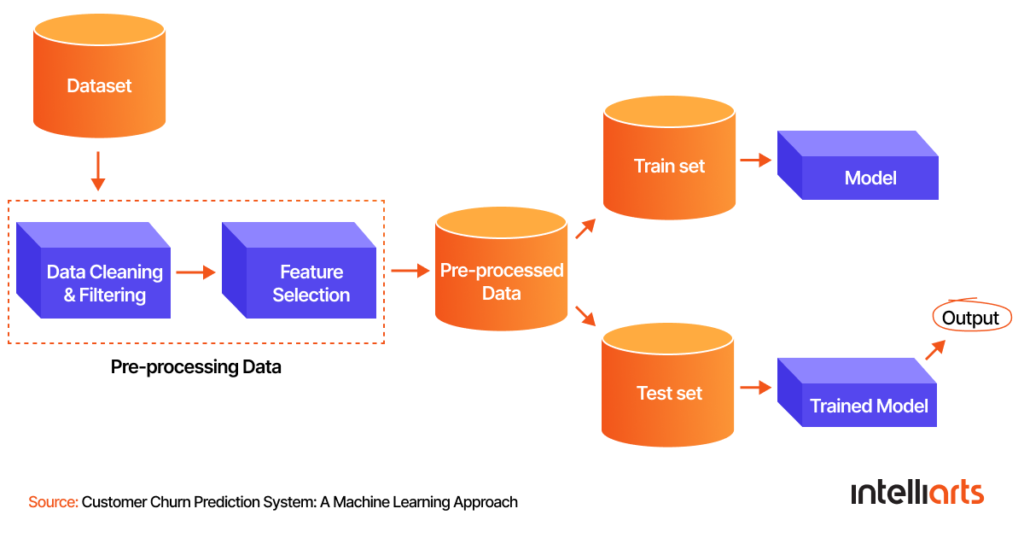In a rapidly evolving world, ML is the driver for innovation across various industries. As a subset of artificial intelligence, this advanced technology leverages the training of algorithms and statistical models to enable systems to perform tasks that are commonly done by humans.
Nearly half of the population is familiar with ML applications, such as voice-based assistants or recommendation models. The same percentage of respondents report that their companies have implemented ML in at least one business process.
In this post, the Intelliarts team of ML engineers will delve you into the usefulness of ML for business. The review is based on Intelliarts experience and real-life case studies of our customers and other companies using the technology.
Importance of machine learning in modern business
Modern-day businesses that strive for success are becoming increasingly digitalized. Not in the last place, this includes using ML. Here are some of the benefits of machine learning to keep in mind should you consider implementing this technology in your company:
- Data-driven decision-making. Machine learning enables businesses to make more accurate and informed decisions by analyzing vast amounts of data quickly and effectively and providing insights based on it.
- Enhanced customer experience. By personalizing services and recommendations, machine learning significantly improves customer satisfaction and engagement. This leads to better operational outcomes and enhanced brand loyalty.
- Improved operational efficiency. Machine learning for business automates routine tasks, optimizes processes, and reduces errors, leading to increased productivity and cost savings. Leading companies report a 30% increase in process efficiency upon ML implementation.
- Better risk management. ML in business provides advanced tools to identify, assess, and mitigate various risks based on historical and real-life data, enhancing financial and operational stability. Statistics reveal that implementation of ML can bring up to 20% reductions in costs for managing risks.
- Enhanced market trend analysis. Machine learning helps in accurately predicting market trends, allowing businesses to adapt strategies proactively. As for trend analysis, it’s estimated that ML algorithms improve forecast accuracy by about 10 percent for volume and around half that for average holding time.
- More reliable cybersecurity. The technology excels in identifying patterns of fraudulent activities and cyber threats, ensuring better security.
- Improved predictive maintenance. ML-based models can predict equipment failures and maintenance needs, reducing downtime and operational costs in manufacturing and other industries.
Machine learning for companies has transformative power. With the increase in the quantity and quality of business data, the usage of smart algorithms is probably the only way to achieve new heights and stay ahead of competitors.
ML algorithms for business applications
ML algorithms are a set of rules or methods used by computers to learn from data. These algorithms allow machines to identify patterns, make decisions, and improve their performance over time without being explicitly programmed to do so. ML models are created upon algorithms. You can review how the range of algorithms within the concept of ML can be classified and applied to particular business tasks in the infographic below:

Regression (Supervised Learning)
Regression algorithms predict a continuous output based on input variables. They establish the relationship between dependent and independent variables and are often used for forecasting, trend analysis, and determining cause-and-effect relationships.
Classification (Supervised Learning)
Classification algorithms categorize data into predefined classes or labels. They are used when the output is a discrete category, such as spam vs. non-spam emails or a disease diagnosis.
Clustering (Unsupervised Learning)
Clustering algorithms group data points into clusters based on similarity or common patterns, without pre-labeled classes. They are used in market segmentation, social network analysis, and image segmentation.
Dimensionality reduction (Unsupervised Learning)
Dimensionality reduction algorithms reduce the number of random variables under consideration, simplifying the model while retaining important information. They help in compressing data and reducing noise.
Reinforcement learning
Reinforcement learning algorithms learn optimal actions through trial and error to achieve a specific goal. They are used in environments where an agent interacts and learns from the consequences of actions, such as in robotics or game playing.
Now when the technicalities of ML are clear, let’s move on to reviewing machine learning use cases:
10 common use cases of machine learning in business processes

#1 Advanced chatbot agents
Advanced chatbots, powered by AI are already a part of customer service, as a new standard. They handle inquiries through messaging, and about 80% of customers have already utilized such a service.
Related use cases are:
- Answering FAQs
- Resolving customer issues
- Transferring to human agents
An example of a company utilizing this technology is Sephora, a multinational retailer. Their chatbot on Facebook Messenger named Beauty Coach, efficiently resolves customer issues and recommends products. It’s one of many chatbot agents already used extensively in many areas. Yet, it must be distinguished from not AI-based chatbots that simply have pre-planned scripts and don’t actually offer AI-driven assistance.
#2 Enhanced decision support systems (DSS)
In modern business processes, DSS helps managers make informed, data-driven decisions. They integrate advanced analytics into daily operations for better performance monitoring and strategic planning.
Related use cases are:
- Performance monitoring
- Sales and forecasting analysis
- Resource allocation
- Executive dashboards and scorecards
Many businesses use DSS for tasks like analyzing sales data, creating reports, and evaluating forecasting results. Executive dashboards and scorecards, accessible from personal workstations, are widely used for tracking operations and supporting strategic decisions.
You may discover additional information about Intelligent forecasting using AI from another blog post of ours.
#3 Customer recommendation engines
Customer recommendation engines, a key machine learning application in business, personalize user experiences by analyzing customer data. These ML-powered systems enhance engagement, retention, and sales by providing tailored suggestions.
Related use cases are:
- Personalized suggestions
- Enhanced customer experience
Businesses are increasingly adopting generative AI recommendation systems to deliver more adaptive and context-aware suggestions. A vivid example of a company utilizing this ML solution is Netflix, which has implemented an algorithm providing personalized suggestions. It enables customers to find a movie or a series that suits their preferences faster.
#4 Predictive customer churn analysis
Predictive customer churn analysis is a powerful business application of machine learning that is crucial for maintaining profitability. It uses data analysis and machine learning algorithms to predict which customers are likely to stop using a service or product.
Related use cases are:
- Identifying at-risk customers
- Customer retention strategies
- Identifying willing-to-buy customers
According to Forbes, reducing churn is significantly more cost-effective than acquiring new customers, emphasizing the importance of churn prediction in business strategies. Churn rate analysis is particularly crucial in subscription-based models like SaaS, where customer retention directly impacts revenue.
You can discover how an ML approach to customer churn analysis can work in the image below:
#5 Dynamic pricing models
Dynamic pricing models, one of the machine learning applications in business, adjust prices in real time based on market conditions and demand. These models enhance profitability and competitiveness by optimally pricing products or services.
Related use cases are:
- Market-responsive pricing
- Time-based pricing
- Analyzing competitor pricing
Airlines and hotels often use dynamic pricing, varying prices based on time and demand. For example, flight prices may increase during peak travel times and decrease during off-peak periods. In the energy sector, electricity prices can vary based on the time of day to match consumption patterns.
#6 Data-driven market segmentation
Data-driven market segmentation is the next of machine learning business applications. It uses machine learning to organize customers into distinct sub-categories based on shared characteristics like demographics, behaviors, or preferences. This approach is revolutionizing marketing strategies.
- Related use cases are:
- Targeted marketing
- Customer insights
Analyzing target customers based on criteria
In e-commerce and other industries, machine learning has replaced traditional, manual methods of customer segmentation to a certain extent. It provides more accurate and efficient insights. The resulting segmentation enables more effective marketing campaigns and informed decision-making across business aspects.
#7 Fraud detection systems
Fraud detection is one of the critical use cases for machine learning in business, addressing the challenge of identifying rare but costly fraudulent activities. Modern systems adapt and uncover emerging fraud patterns, moving beyond traditional rule-based methods.
Related use cases are:
- Fraud pattern identification
- Adaptive fraud prevention
Financial institutions tend to implement machine learning-based fraud detection systems, significantly improving fraud identification and customer satisfaction. A direct consequence of unprevented fraud is up to a 5% loss in yearly revenue. So, fraud detection in banking ensured, not in the last place, by means of ML-driven systems, is trending. Fraud detection in insurance utilizes advanced machine learning algorithms to pinpoint and prevent fraudulent claims, enhancing the integrity and efficiency of the industry.
You can discover how Visa’s AI solution is used in fraud detection from the below video:
#8 Supply chain optimization
Supply chain optimization, a crucial machine learning application for companies, significantly enhances efficiency and performance. It involves integrating AI and machine learning to automate and improve supply chain processes.
Related use cases are:
- Autonomous demand and supply correlation
- Route planning
- Revenue and cost management
As such, Consumer Packaged Goods (CPG) companies are leveraging machine learning for autonomous supply chain planning. It leads to significant performance improvements and reductions in the number and magnitude of overstocking and understocking cases.
#9 Optimization of operational processes
Optimization of operational processes, like invoice processing, inventory management, or scheduling appointments, using AI is a major focus for IT leaders. With such innovations, they aim to streamline business processes and reduce manual interventions.
Furthermore, AI for network marketing is enhancing decision support systems by enabling more targeted and efficient marketing efforts.
Related applications are:
- Robotic Process Automation (RPA)
- AI-driven process improvement
AI’s role in business process optimization is growing. The RPA industry is expected to exceed 13 billion US dollars by 2030, a more than 12 billion dollar increase from 2020.
#10 Healthcare diagnostics and research
Machine learning in healthcare diagnostics and research revolutionizes patient care and medical discoveries. It involves analyzing vast healthcare data to improve diagnoses, treatments, and research outcomes.
Related use cases are:
- Enhanced diagnostics
- Research acceleration
AI systems are increasingly used in radiology to detect diseases from medical images. Machine learning also aids in genomic research, identifying patterns linked to genetic disorders and potential therapies.
Real cases of using machine learning
As it can be observed, the applications of ML in business are vast. Let’s get down to several case studies, from lead scoring software to preventing fraudulent transactions, that shed light on different ways and aspects of using smart technology in a real-life environment:
Home and car insurance company
In case of machine learning in insurance, the challenge was to help company replace its inefficient system for communicating with leads with a custom predictive lead-scoring solution. The solution by Intelliarts was a predictive lead scoring model capable of forecasting how likely the lead would buy an insurance policy. The end model enabled the customer to cut off approximately 6% of non-efficient leads, which resulted in a 1.5% increase in profit within a few months.
Big appliance manufacturer case study
The manufacturer experienced an issue with frequent and unexpected breakdowns in their production line. To solve their issue, Intelliarts developed a machine learning (ML) model using the Extreme Gradient Boosting algorithm. The model, trained with 14.3 GB of data from IoT devices, could predict which parts were most likely to break down. This ML model showed 90% accuracy in predicting failures and helped the company cut maintenance costs by 5%.
Read also: Predictive Maintenance in Manufacturing
PayPal
One of the companies that uses machine learning, PayPal, faced challenges in identifying and preventing fraudulent transactions. To tackle this, they implemented fraud detection ML algorithms that scrutinize various aspects of each transaction, including the transaction location, the device utilized, and the user’s historical behavior. This approach has significantly enhanced PayPal’s ability to safeguard its users’ transactions and maintain the integrity of its payment platform.
YouTube
YouTube, a long-time user of machine learning in its operations, employs recommendation algorithms to suggest videos to its viewers. This method is grounded in analyzing extensive historical data. As of now, YouTube’s recommendations consider over 80 billion pieces of information related to each user. This immense data pool necessitates the use of large-scale neural networks, which YouTube has employed since the year 2008.
Difficulties with implementing ML
There are a range of challenges with developing ML models, integrating them into your processes, and training the team for adequate usage. Here are some common difficulties, with solutions Intelliarts apply to tackle them:
- Inappropriate data quality and quantity
What is it? One of the primary challenges that businesses face is ensuring they have enough high-quality data for ML algorithms.
How does Intelliarts solve it? Our company assists by offering expertise in data collection and curation. We help businesses understand the type of data needed, and we use advanced techniques for cleaning and organizing data to ensure it’s suitable for effective ML training.
- Skill Gap
What is it? Many businesses lack the in-house expertise necessary to develop and implement ML solutions.
How does Intelliarts solve it? We bridge this gap by providing a team of experienced data scientists and ML engineers. This includes the development of ML models and their integration into existing business processes and systems.
- Inadequate cost and resource management
What is it? Developing ML solutions can be costly and resource-intensive, especially for companies that don’t have an in-house team of expert ML developers.
How does Intelliarts solve it? We help companies optimize their investment by using scalable cloud-based solutions and efficient algorithms that reduce computational costs. Our experience allows us to build models that are both cost-effective and powerful.
- Integration with existing systems
What is it? Integrating ML models with current business systems can be troublesome because of the specificities of existing digital infrastructure or the complexity of the software solution to be integrated.
How does Intelliarts solve it? Our approach involves a thorough analysis of existing IT infrastructure and business processes, enabling seamless integration of ML solutions. We ensure that the ML systems we develop are compatible with our clients’ existing technology stacks and business workflows.
- Ethical and legal considerations
What is it? With the growing importance of ethical AI and data privacy laws, businesses often struggle to navigate these aspects.
How does Intelliarts solve it? We offer AI consultancy services on ethical AI practices and ensure compliance with data protection laws like GDPR. Our team stays abreast of legal developments in AI and advises partners on best practices for data usage and model fairness.
Final take
Machine learning use cases are vast. Models built upon supervised, unsupervised, and reinforcement learning algorithms have great potential to innovate business operations in multiple ways, including leveraging AI for lead generation to attract and convert high-quality prospects. As can be observed, businesses worldwide increasingly implement the technology to their advantage.
Introducing ML in business is a complex intervention requiring expertise and experience in the technology. Partnering with a trusted vendor of AI and ML services is the right call for most companies. Drop Intelliarts a line. Our team of expert engineers is ready, willing, and able to assist you.
FAQ
1. Is machine learning only for large businesses?
No, machine learning is not exclusive to large businesses. Small and medium-sized enterprises can also leverage most ML technologies on their scale.
2. What types of data are used in machine learning for business?
Businesses use a variety of data types for machine learning, including customer data, transactional data, operational data, social media data, and sensor data.
3. Do businesses need a large amount of data to implement machine learning?
While having more data can be beneficial, businesses can still purchase or find open-source datasets for training as well as generate synthetic data. Then, they can start implementing machine learning with smaller real-life datasets and scale up as they grow. More information you can get by requesting big data consulting.












